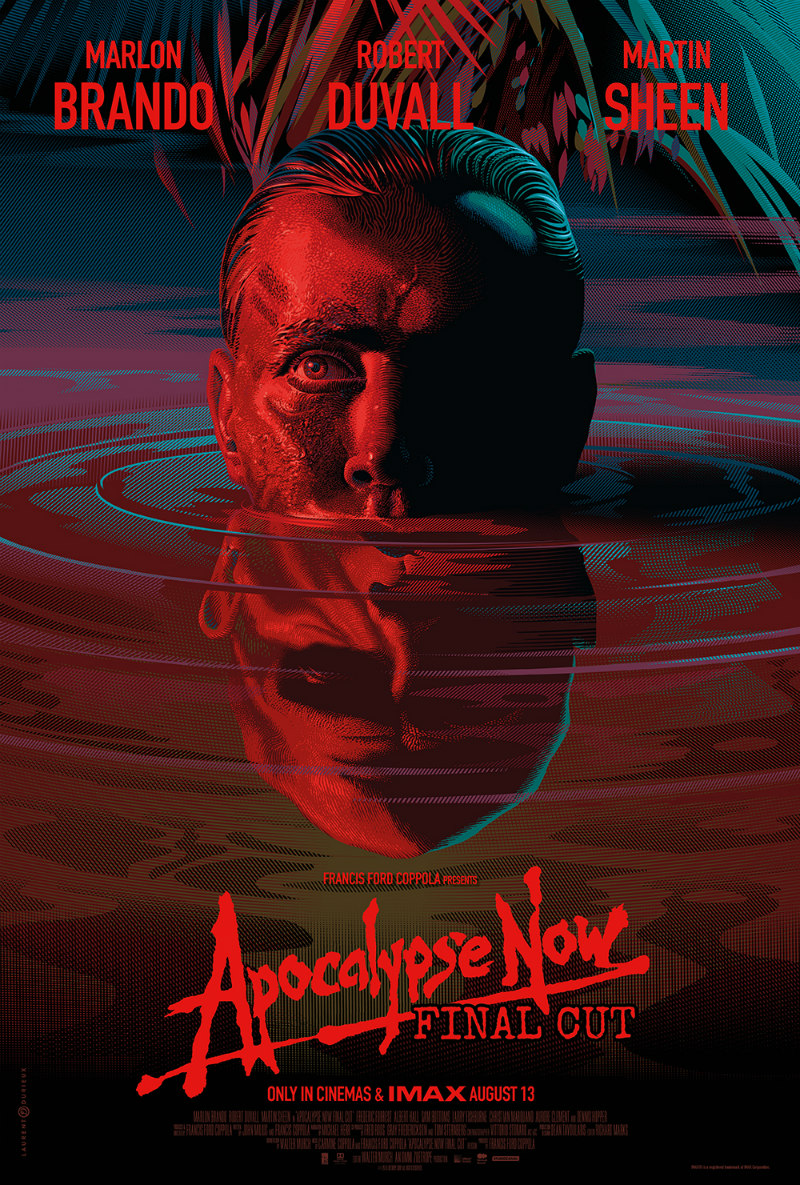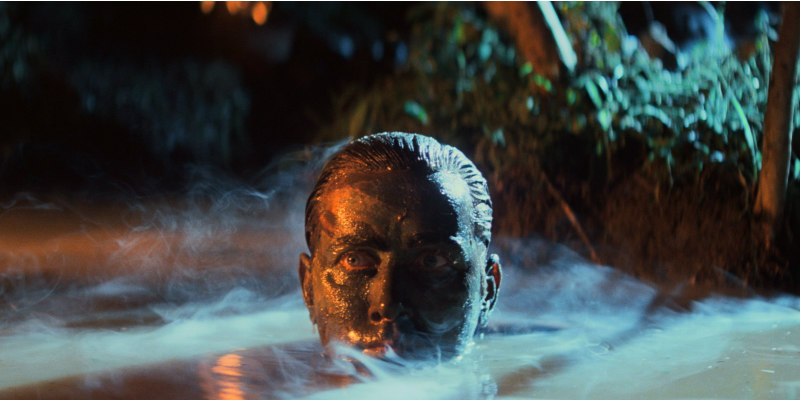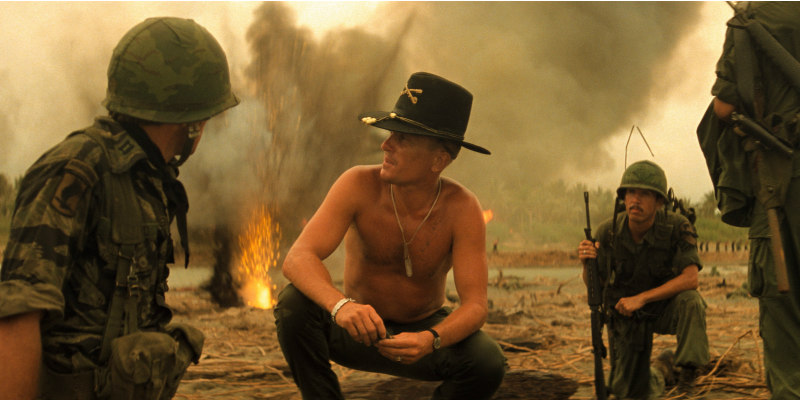
Newly restored cut of Francis Ford Coppola's Vietnam war classic.
Review by Musanna Ahmed
Directed by: Francis Ford Coppola
Starring: Martin Sheen, Marlon Brando, Robert Duvall, Dennis Hopper, Laurence Fishburne

One of Francis Ford Coppola’s masterpieces, Apocalypse Now is renowned not only for its virtuoso filmmaking but its rich production history. There are famous documents about its making-of and you're probably familiar with the supplementary material, which includes the documentary Hearts of Darkness and Michael Herr's Vietnam memoir 'Dispatches', both of which have significant legacies themselves. Final Cut is a highlight in the thick chronicle of Apocalypse Now: it takes one of the greatest films of all time and exalts it with a roaring sound remaster and stunning 4K imagery, offering an IMAX experience too.
You all know the plot by now - it’s a loose adaptation of Joseph Conrad’s influential novel 'Heart of Darkness', relocated to the Vietnam War. We follow U.S. Army special operations officer Captain Benjamin. L Willard (Martin Sheen), who’s assigned by the funkily named General R. Corman (G.D. Spradlin) to execute Colonel Walter E. Kurtz (Marlon Brando), a feared rogue officer living deep in the jungles of Cambodia commanding an outpost of Montagnard with a cultish grasp.


It’s essentially a road movie on water; Captain Willard’s journey along the Mekong River to "terminate with extreme prejudice" finds him losing his sanity in the heart of darkness as he and his patrol boat crew cross paths with various intriguing characters and engage in ferocious assaults.
Final Cut differs from the original by running for 30 minutes longer, yet 20 minutes shorter than the Redux edition released in 2001. As audiences who saw Redux will know, the French plantation chapter was the lengthiest addition to the story. It's been preserved for this cut. Details for those unfamiliar with the sequence: the crew are confronted along the river by a French unit living in luxury, ruling over the locals and training them as troops for this makeshift base that belongs to one of the colonist families.
Willard’s crew is invited to stay for the night by the French patriarchs. When they all dine together, the volume of their conversation tremendously rises as angry Frenchmen argue over the differences between them and the Americans and why it was right for the French to colonise the Indochina territories some years prior to the current war. Willard quietly sits in their company, eyeing up the wispy blonde widow sat across from him and they satisfy their sexual tension at the end of the evening before he resumes his journey the next morning with the boys in green.
It’s a fascinating detour with strong performances, cinematography and dialogue (which was to be expected, considering just about every single other scene) but what didn't work for me was the overuse of grating synths. Compared to the use of sound throughout the movie, the unfading noise gives the whole segment an oneiric feel and, who knows, maybe it’s all a dream anyway of Willard wishing for just one evening with a beautiful meal and a beautiful French woman - I’m not sure why he'd fantasise of the angsty men in the mix though, so this interpretation is a bit of a reach.


You can see why Coppola originally cut it as it's rather inessential to the core journey (none of the settlers can help with finding Kurtz) but he obviously loves it enough to have kept it in. Then again, sometimes a filmmaker's most beloved moments can be questionable - look at the recent case of Avengers: Endgame.
In an introductory video featured in the desperate-to-beat-Avatar re-release, director Anthony Russo hypes up an unfinished deleted scene in the credits as one of his favourite moments - it turns out to be a totally trivial scene of the Hulk saving some citizens. Other additions in Final Cut, on the other hand, are invisibly inserted. They’re either natural extensions of existing moments or points of intrinsic introspection.
This re-release may not be the most narratively robust version of the film but it’s certainly the most essential one to see on the big screen. It’s incredibly remastered; it's difficult to state how powerful the new Dolby Atmos sound is without coming off like a shill for Dolby. But shilling is justified, and I’ll take it a step further and compare this viewing experience to 4DX, the one where your seats rumble and the sound plays from 360 degrees.
But the key difference between this experience and the contemporary theatrical gimmicks is that it isn't aurally upgraded for choice moments, as with 4DX - the world-class sound design and editing is a basic tenet for the movie, fully immersing us into the cacophony of helicopters, gunfire and the indelible sounds of war that cause our seats to rumble and our ears to react as if we’re right there in the scene with the characters.


The 4K images are astonishing: lush colours of the Philippines (doubling for Vietnam) invite such sensations of perhaps the world’s most beautifully awful boat trip. Rich black tones emphasise the effectiveness of Coppola’s influence of German expressionist techniques, especially when shooting Brando in the shadows of his hut. Remarkably, it’s the first time the film has been restored from its original film negative - the restoration team should be rewarded at industry level for their monumental work. Give them a special Oscar!
The combination of Apocalypse Now’s celebrated narrative strengths and the great technical enhancements in Final Cut means it may be the best film you’ll ever see in IMAX. IMAX or standard screen, do not miss the chance to see this all-timer in the cinema.

Apocalypse Now: Final Cut is in UK/ROI cinemas August 13th.
Carol Reed's Masterpiece THE THIRD MAN Returns To Cinemas - New Trailer & Posterhttps://t.co/sz9DeI4E78 pic.twitter.com/m3vaeGlpRz— 𝕋𝕙𝕖𝕄𝕠𝕧𝕚𝕖𝕎𝕒𝕗𝕗𝕝𝕖𝕣.𝕔𝕠𝕞 🎬 (@themoviewaffler) August 6, 2019
